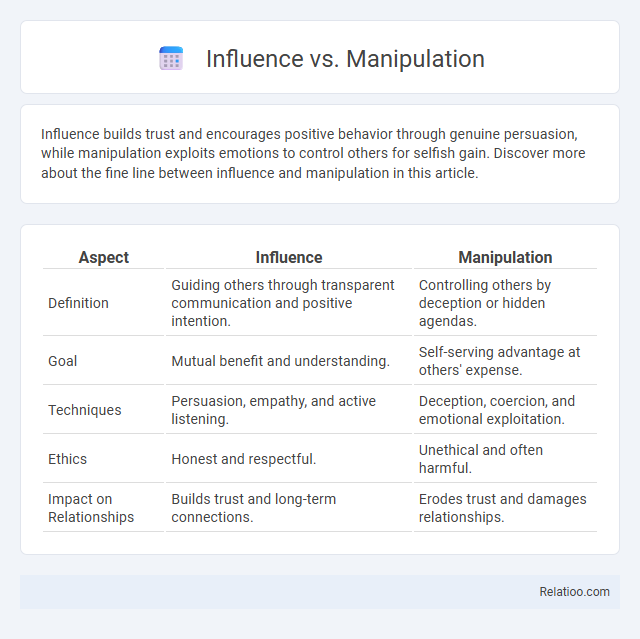Influence builds trust and encourages positive behavior through genuine persuasion, while manipulation exploits emotions to control others for selfish gain. Discover more about the fine line between influence and manipulation in this article.
Table of Comparison
| Aspect | Influence | Manipulation |
|---|---|---|
| Definition | Guiding others through transparent communication and positive intention. | Controlling others by deception or hidden agendas. |
| Goal | Mutual benefit and understanding. | Self-serving advantage at others' expense. |
| Techniques | Persuasion, empathy, and active listening. | Deception, coercion, and emotional exploitation. |
| Ethics | Honest and respectful. | Unethical and often harmful. |
| Impact on Relationships | Builds trust and long-term connections. | Erodes trust and damages relationships. |
Understanding Influence and Manipulation
Understanding influence involves recognizing subtle techniques that shape others' attitudes and behaviors through persuasion and social dynamics. Manipulation, in contrast, often employs deceptive or covert tactics to control decisions for self-serving purposes. Distinguishing between ethical influence and harmful manipulation is essential for fostering trust and authentic relationships in personal and professional contexts.
Defining Influence: Ethical Persuasion
Influence involves ethical persuasion that respects the autonomy and interests of others, unlike manipulation which often relies on deceit or coercion to achieve hidden agendas. Your ability to influence effectively hinges on transparent communication, trust-building, and genuine intent to benefit all parties involved. Understanding these distinctions helps you foster positive relationships and long-term cooperation.
What Constitutes Manipulation?
Manipulation constitutes a deliberate effort to control or exploit others through deceptive, coercive, or unethical tactics that undermine their free will and decision-making. Unlike influence, which encourages voluntary change by appealing to reason or emotion, manipulation involves hidden agendas and often causes harm or loss of autonomy. Understanding these distinctions helps you recognize when your interactions cross ethical boundaries and ensures respectful communication.
Key Differences Between Influence and Manipulation
Influence involves guiding others' thoughts or behaviors through persuasion and trust, whereas manipulation exploits deceit and pressure to control outcomes for personal gain. Influence relies on transparency and mutual benefit, promoting ethical interactions, while manipulation undermines autonomy by hiding true intentions. Understanding these distinctions is crucial for fostering positive relationships and maintaining integrity in communication.
Psychological Mechanisms Behind Influence
Influence operates through subtle psychological mechanisms such as social proof, reciprocity, and authority that shape behavior by aligning with individuals' values and beliefs, fostering voluntary compliance. Manipulation, in contrast, exploits cognitive biases and emotional vulnerabilities through deception or coercion to achieve hidden agendas, often undermining autonomy. Understanding these distinctions is crucial for ethical communication and effective interpersonal dynamics.
Red Flags of Manipulation Tactics
Manipulation tactics often include red flags such as guilt-tripping, gaslighting, and exploiting vulnerabilities to control others covertly. Unlike genuine influence, manipulation relies on deceit and emotional exploitation to achieve selfish goals. Recognizing these warning signs is crucial for maintaining healthy boundaries and protecting oneself from psychological abuse.
Influence in Leadership and Relationships
Influence in leadership and relationships involves guiding others through trust, respect, and positive communication, fostering authentic connections that motivate desired actions. Unlike manipulation, which exploits emotions or information for personal gain, influence empowers Your team or peers by encouraging collaboration and shared goals. Effective influencers build credibility and inspire long-term commitment by prioritizing transparency and ethical interactions.
Ethical Boundaries: When Influence Crosses Into Manipulation
Influence builds trust and respects your autonomy by encouraging decisions through transparency and mutual benefit, whereas manipulation exploits emotions and information asymmetry to control outcomes unethically. Ethical boundaries are crossed when persuasion ignores consent, distorts truth, or prioritizes the influencer's gain over your well-being. Recognizing these differences ensures your interactions remain respectful and principled, fostering genuine relationships over coercive tactics.
Protecting Yourself From Manipulation
Protecting yourself from manipulation requires recognizing the subtle differences between influence, which is based on transparency and mutual benefit, and manipulation, which relies on deception and exploitation. Building strong personal boundaries and developing critical thinking skills empower you to identify manipulative tactics such as guilt-tripping, gaslighting, or misinformation. Staying informed and trusting your intuition are crucial for maintaining control over decisions and safeguarding your emotional well-being.
Cultivating Positive Influence in Everyday Life
Cultivating positive influence in everyday life involves inspiring others through genuine actions, clear communication, and empathy, rather than relying on manipulation or coercion. By fostering trust and respect, you can encourage meaningful change and build lasting relationships that benefit both personal and professional environments. Understanding the ethical difference between influence and manipulation empowers your ability to lead with integrity and create a supportive community.

Infographic: Influence vs Manipulation
 relatioo.com
relatioo.com